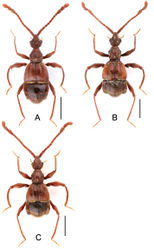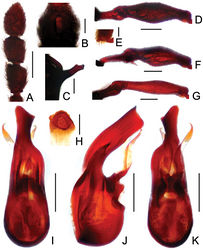Pselaphodes distincticornis
| Notice: | This page is derived from the original publication listed below, whose author(s) should always be credited. Further contributors may edit and improve the content of this page and, consequently, need to be credited as well (see page history). Any assessment of factual correctness requires a careful review of the original article as well as of subsequent contributions.
If you are uncertain whether your planned contribution is correct or not, we suggest that you use the associated discussion page instead of editing the page directly. This page should be cited as follows (rationale):
Citation formats to copy and paste
BibTeX: @article{Yin2012ZooKeys251, RIS/ Endnote: TY - JOUR Wikipedia/ Citizendium: <ref name="Yin2012ZooKeys251">{{Citation See also the citation download page at the journal. |
Ordo: Coleoptera
Familia: Staphylinidae
Genus: Pselaphodes
Name
Pselaphodes distincticornis Yin & Li sp. n. – Wikispecies link – ZooBank link – Pensoft Profile
Type material
(2 ♂♂, 1 ♀). Holotype: ♂, labeled ‘CHINA: Yunnan, Dali Bai Aut. Pref. / 36 km N Dali, ruderal pasture wtih / pines and shrubs, 26°01'20"N, / 100°08'14"E, 2158 m, litter sifted / under pines and shrubs, 24.VIII.2009, / leg. M. Schülke [CH09-04]’ (cSch). Paratype: 1 ♂, same label data as holotype (SNUC); 1 ♀, same label data sa holotype, except ‘D.W. Wrase [04]’.
Diagnosis
Reddish brown; length 2.74–2.88; postgenae rounded; antennomeres IX–XI enlarged, IX modified in the male; pronotum with lateral margins roundly expanded laterally; with long thick metaventral processes; metacoxae simple; aedeagus with asymmetric median lobe elongate.
Description
Male (Fig. 11A). Length 2.74–2.88. Head longer than wide, HL 0.59–0.60, HW 0.58–0.59; eyes each composed of about 40 facets. Antennal clubs as in Fig. 12A. Pronotum (Fig. 12B) about as long as wide, PL 0.58–0.59, PW 0.58–0.60, with round lateral margins. Elytra wider than long, EL 0.72–0.73, EW 1.11–1.12. Long metaventral processes with truncate apices (Fig. 12C). Protrochanters and profemora simple (Fig. 12D), protibiae with short apical tubercle (Fig. 12E); mesotrochanters (Fig. 12F) with small spine at ventral margin; metatrochanters and metafemora (Fig. 12G) simple. Abdomen broad at base and narrowed apically, AL 0.85–0.96, AW 1.11–1.14. Sternite IX as in Fig. 12H. Aedeagus length 0.71, with asymmetric median lobe distinctively elongate (Figs 12I–K).
Female. Similar to male in general; BL 2.79, HL 0.64, HW 0.58, PL 0.59, PW 0.59, EL 0.62, EW 1.16, AL 0.94, AW 1.22. Eyes each composed of about 30 facets. Metaventral processes absent.
Comparative notes
The unmodified antennal clubs are shared in Pselaphodes fengtingae Yin, Li et Zhao (Zhejiang, Jiangxi) and Pselaphodes parvus Yin, Li et Zhao (Guizhou). Pselaphodes distincticornis can be separated from bothspeciesby the larger size, the simple protrochanters and profemora, and the distinctively asymmetric and elongate median lobe of the aedeagus. Both Pselaphodes fengtingae and Pselaphodes parvus have the protrochanters with a small ventral spine, and the profemora with a larger spine at the ventral margin, and have the aedeagus with an asymmetric but much shorter median lobe.
Distribution
Southwest China: Yunnan.
Biology
Species were sifted from leaf litter under pines and shrubs in a ruderal pasture.
Etymology
Species name combined from Latin stems ‘distinct’ and ‘corn’, referring to the large median metaventral processes of the new species.
Original Description
- Yin, Z; Li, L; 2012: Notes on Michael Schülke’s pselaphine collections from China. – Tyrini. I. genera Labomimus Sharp, Linan Hlaváč and Pselaphodes Westwood (Coleoptera, Staphylinidae, Pselaphinae) ZooKeys, 251: 83-118. doi
Images
|

